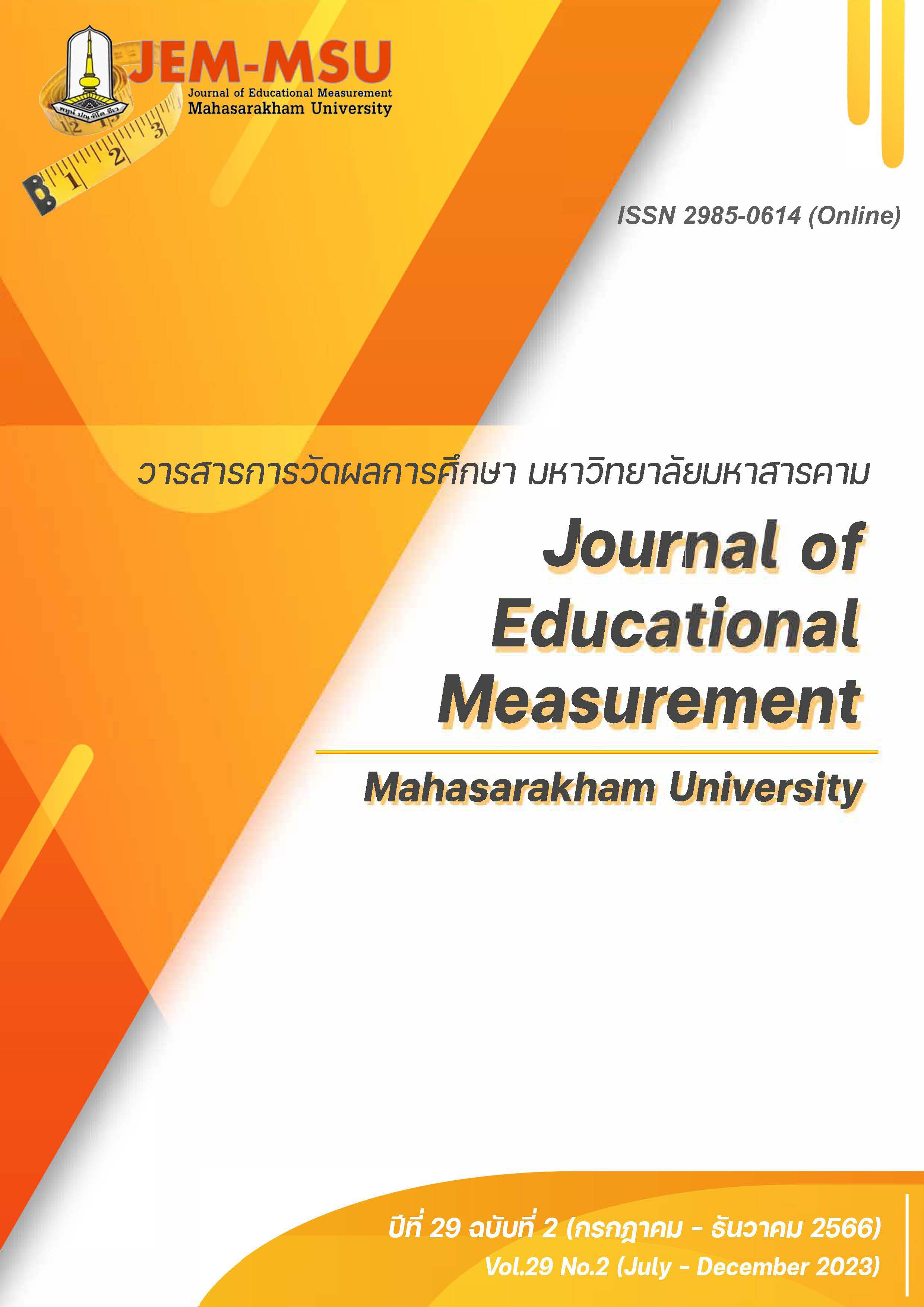แนวทางการพัฒนาการนำผลการประเมิน การรับรอง และการประกันคุณภาพการศึกษาไปใช้ในการยกระดับคุณภาพการศึกษาระดับอุดมศึกษา
Main Article Content
บทคัดย่อ
การวิจัยครั้งนี้ มีความมุ่งหมายเพื่อ (1) ศึกษาสภาพการนำผลการประเมิน การรับรอง และการประกันคุณภาพการศึกษาไปใช้ในการพัฒนาคุณภาพการศึกษาระดับอุดมศึกษา และ (2) ศึกษาแนวทางการพัฒนาการนำผลการประเมิน การรับรอง และการประกันคุณภาพการศึกษาไปใช้ในการพัฒนาคุณภาพการศึกษาระดับอุดมศึกษา การวิจัยครั้งนี้ เป็นการวิจัยแบบผสมวิธี (mixed methods research) แบบเรียงลำดับอธิบายขยายความ (explanatory sequential design) แบ่งออกเป็น 2 ระยะ ระยะแรก เป็นการวิจัยเชิงปริมาณ ตัวอย่างวิจัย คือ สถาบันอุดมศึกษาภายใต้สังกัดกระทรวงการอุดมศึกษา วิทยาศาสตร์ วิจัยและนวัตกรรม (อว.) จำนวน 16 สถาบัน เครื่องมือที่ใช้ในการวิจัย คือ แบบสอบถาม วิเคราะห์ข้อมูลโดยใช้สถิติบรรยาย ได้แก่ ค่าเฉลี่ย ส่วนเบี่ยงเบนมาตรฐาน ระยะที่สอง เป็นการวิจัยเชิงคุณภาพ ผู้ให้ข้อมูลสำคัญ คือ ผู้บริหารมหาวิทยาลัย ผู้บริหารคณะ และอาจารย์ผู้รับผิดชอบหลักสูตร รวมจำนวน 20 คน เก็บรวบรวมข้อมูลด้วยการสนทนากลุ่ม วิเคราะห์ข้อมูลเชิงคุณภาพด้วยการวิเคราะห์เนื้อหาและสร้างข้อสรุปแบบอุปนัย
ผลการวิจัยสรุปได้ดังนี้
1. การนำผลการประเมินคุณภาพภายใน (ระดับหลักสูตร) ไปใช้ในการพัฒนาคุณภาพการศึกษาระดับอุดมศึกษา ในภาพรวม อยู่ในระดับมาก (M = 4.03, SD = 0.59) ในขณะที่การนำผลจากการประเมินคุณภาพภายนอก (ระดับคณะ/สถาบัน) ไปใช้ในการพัฒนาคุณภาพการศึกษาระดับอุดมศึกษา ตามการรับรู้ ของอาจารย์ผู้รับผิดชอบหลักสูตร อยู่ในระดับมาก (M = 3.75, SD = 0.69)
2. แนวทางการพัฒนาการนำผลการประเมิน การรับรอง และการประกันคุณภาพการศึกษาไปใช้ในการพัฒนาคุณภาพการศึกษาระดับอุดมศึกษา มี 7 แนวทาง คือ (1) การวางระบบกำกับ ติดตาม และประเมินผลการพัฒนาคุณภาพตามมาตรฐานของมหาวิทยาลัย (2) การสร้างวัฒนธรรมคุณภาพ (3) การสร้างความรู้ ความเข้าใจในระบบการประเมินคุณภาพการศึกษา ให้แก่ผู้บริหารและบุคลากรของส่วนงาน (4) การเพิ่มพูนความรู้ ประสบการณ์ และความเชี่ยวชาญด้านการประเมินคุณภาพการศึกษา ให้แก่ผู้บริหารและบุคลากรของส่วนงาน และ (5) การสื่อสารผลการประเมินไปยังผู้ที่มีส่วนเกี่ยวข้อง (6) การพัฒนากลไกทางวิชาการเพื่อสนับสนุนการดำเนินงานการประเมินคุณภาพการศึกษา และ (7) การพัฒนาระบบฐานข้อมูลสารสนเทศเพื่อสนับสนุนการดำเนินงานการประเมินคุณภาพการศึกษา
Article Details

อนุญาตภายใต้เงื่อนไข Creative Commons Attribution-NonCommercial-NoDerivatives 4.0 International License.
เนื้อหาและข้อมูลในบทความที่ลงตีพิมพ์ในวารสารการวัดผลการศึกษา มหาวิทยาลัยมหาสารคาม ถือเป็นข้อคิดเห็นและความรับผิดชอบของผู้เขียนบทความโดยตรง ซึ่งกองบรรณาธิการวารสาร ไม่จำเป็นต้องเห็นด้วย หรือร่วมรับผิดชอบใดๆ
บทความ ข้อมูล เนื้อหา รูปภาพ ฯลฯ ที่ได้รับการตีพิมพ์ในวารสารการวัดผลการศึกษา มหาวิทยาลัยมหาสารคาม ถือเป็นลิขสิทธิ์ของวารสารการวัดผลการศึกษา มหาวิทยาลัยมหาสารคาม หากบุคคลหรือหน่วยงานใดต้องการนำทั้งหมดหรือส่วนใดส่วนหนึ่งไปเผยแพร่ต่อหรือกระทำการใดๆ จะต้องได้รับอนุญาตเป็นลายลักษณ์อักษรจากวารสารการวัดผลการศึกษา มหาวิทยาลัยมหาสารคาม ก่อนเท่านั้น
เอกสารอ้างอิง
Cousins, J.B., Amo, C., Bourgeois, I., Chouinard, J., Goh, G.C., & Lahey, R. (2008). Organizational capacity to do and use evaluation: Results of a Pan-Canadian survey of evaluators. Canadian Journal of Program Evaluation, 23(3), 1 – 35. https://www.utpjournals.press/doi/pdf/10.3138/cjpe.0023.002
Creswell, J.W., & Plano Clark, V.L. (2018). Designing and conducting mixed methods research (3rd ed.). Sage.
Johnson, K., Greenseid, L.O., Toal, S.A., King, J.A., Lawrenz, F., & Volkov, B. (2009). Research on evaluation use: A review of the empirical literature from 1986 to 2005. American Journal of Evaluation, 30(3), 377 – 410. https://doi.org/10.1177/1098214009341660
O’Neil, G., & Bauer, M.W. (2018). Pathways to use of communication campaigns’ evaluation findings within international organizations. Evaluation and Program Planning, 69, 82 – 91. https://doi.org/10.1016/j.evalprogplan.2018.04.013
Yusa, A., Hynie, M., & Mitchell, S. (2016). Utilization of internal evaluation results by community mental health organizations: Credibility in different forms. Evaluation and Program Planning, 54, 11 – 18. https://doi.org/10.1016/j.evalprogplan.2015.09.006
Kanjanawasee, S. (2011). Theory of evaluation (8th ed.). Chulalongkorn University Press. (in Thai)
Ministry of Education. (2018a, Febuary 23). Ministerial regulations educational quality assurance B.E. 2561. https://dl.parliament.go.th/handle/20.500.13072/528204 (in Thai)
Ministry of Education. (2018b, August 17). Higher education standards B.E. 2561. Ministry of Education. https://dl.parliament.go.th/handle/20.500.13072/543257 (in Thai)
Ministry of Education. (2019, May 1). National Education (No.4) Act B.E. 2562. https://ratchakitcha.soc.go.th/documents/17078664.pdf (in Thai)
Sujiva, S., PasiPhol, C. & Panjamawat, T. (2016). A summary of monitoring of external evaluation utilization to improve the educational quality of basic education, vocational education, and higher education as unqualified schools of the third round (B.E. 2554 – 2558). Office for National Education Standards and Quality Assessment (Public Organization). https://www.onesqa.or.th/th/contentlist-view/1211/2793/ (in Thai)


